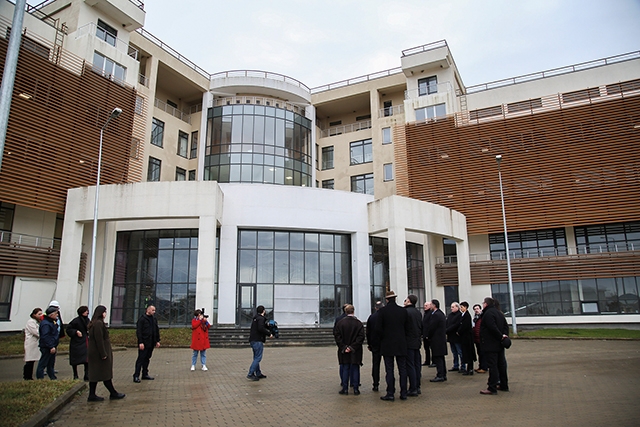Coronavirus & Opportunities to Ease Georgia’s Territorial Dilemma
Op-Ed
Coronavirus presents some avenues for re-establishing contacts between Georgia’s separatist territory of Abkhazia and the government in Tbilisi. Help from Tbilisi is crucial, as Russia, itself in spiraling crisis with a rising death toll and the pandemic reaching the heartland of the country, is unlikely to provide substantial medical help to the two regions.
This presents an opportunity for the Georgian government to engage the occupied territories through the provision of medical equipment and transfer of virus-hit patients from the two regions to various hospitals in western Georgia and Tbilisi. So far, up to 100 persons from Abkhazia have been treated on Tbilisi-controlled territory. The opportunity presented by the coronavirus follows recent statements in Sokhumi on engagement with Tbilisi.
Following the early 2020 demonstrations in Sokhumi against the then de-facto president, Raul Khajimba, and the “presidential elections” on March 22nd when a long-time opposition leader, Aslan Bzhania, received the majority of votes, a notable twist in the rhetoric of the Abkhaz politicians has been seen. “Whether we [Abkhazians] like it or not, Georgians and the Georgian state are our neighbors,” Bzhania stated. This is something different from the decade-long uncompromising view in Sokhumi towards governments in Tbilisi.
Moreover, the new Abkhaz “president” also suggested building a new bilateral negotiating platform to address security issues along the Enguri River, which serves as a dividing line between Abkhazia and the rest of Georgia. For the moment, there is only one, the Geneva format, which presupposes cooperation between Tbilisi and Sokhumi on issues which are raised on an ad hoc basis, but with a Russian presence at the negotiating table.
We could also argue that Bzhania’s propositions reflect a wider development, namely, Russia’s likely displeasure with his candidacy. Indeed, Bzhania’s background reveals some insight, as he was poisoned twice recently, mainly believed to be because of his political activities and, as some in Abkhazia think, both cases could be related to Russia.
The new de-facto Abkhaz president might not be Moscow’s primary choice, as his views on relations with Tbilisi are different from Russia’s South Caucasus policy. It will prove extremely difficult to bypass Russia in any potential negotiating platform, but Bzhania’s idea offers an interesting perspective into the evolving thinking among Abkhaz politicians. Another reason for this shift in Abkhazia can be related to long-lasting problems in the region, such as failure of wider recognition of independence, economic underdevelopment, and growing discontent in the Kremlin with how Russian money is being spent there. Moreover, Moscow increasingly regards the Abkhaz political elite as predatory, focused only on extracting economic benefits. Security-wise too, in the last couple of years several Russian tourists have been killed, hurt or kidnapped during summer periods in Abkhazia.
Despite these long-standing troubles, the Kremlin’s pressure on Abkhazia will remain decisive. The region continues to depend on Russia economically and security-wise and will continue to be seen by Moscow as a tool to limit Georgia’s westward NATO- and EU-membership goals. Nevertheless, the above-mentioned problems in Abkhaz-Russian relations create some space for the Georgian government to maneuver and use those differences to its advantage.
By Emil Avdaliani
Image: The new Rukhi hospital was recently opened about a kilometer from the Enguri Bridge, which connects Russian-occupied Abkhazia with the rest of Georgia. Source: president.gov.ge












